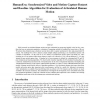Free Online Productivity Tools
i2Speak
i2Symbol
i2OCR
iTex2Img
iWeb2Print
iWeb2Shot
i2Type
iPdf2Split
iPdf2Merge
i2Bopomofo
i2Arabic
i2Style
i2Image
i2PDF
iLatex2Rtf
Sci2ools
166
click to vote
IJCV
2010
2010
HumanEva: Synchronized Video and Motion Capture Dataset and Baseline Algorithm for Evaluation of Articulated Human Motion
While research on articulated human motion and pose estimation has progressed rapidly in the last few years, there has been no systematic quantitative evaluation of competing methods to establish the current state of the art. We present data obtained using a hardware system that is able to capture synchronized video and ground-truth 3D motion. The resulting HUMANEVA datasets contain multiple subjects performing a set of predefined actions with a number of repetitions. On the order of 40, 000 frames of synchronized motion capture and multi-view video (resulting in over one quarter million image frames in total) were collected at 60 Hz with an additional 37, 000 time instants of pure motion capture data. A standard set of error measures is defined for evaluating both 2D and 3D pose estimation and tracking algorithms. We also describe a baseline algorithm for 3D articulated tracking that uses a relatively standard Bayesian framework with optimization in the form of Sequential Importanc...
Related Content
| Added | 27 Jan 2011 |
| Updated | 27 Jan 2011 |
| Type | Journal |
| Year | 2010 |
| Where | IJCV |
| Authors | Leonid Sigal, Alexandru O. Balan, Michael J. Black |
Comments (0)

